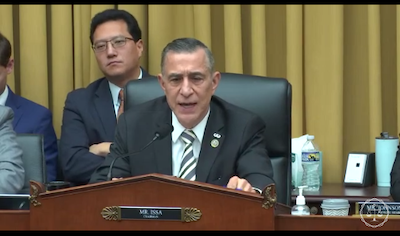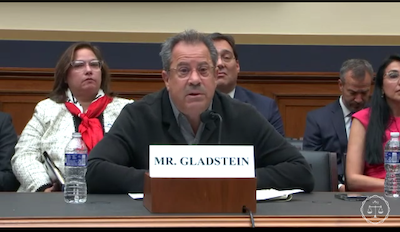“McKnight noted that, of the thousands of takedown requests issued for each UFC event, 26% of infringing content is allowed to stay online for more than an hour.”

Rep. Darrell Issa
On December 13, the U.S. House Judiciary Subcommittee on Courts, Intellectual Property, and the Internet held a hearing titled Digital Copyright Piracy: Protecting American Consumers, Workers, and Creators to examine the current state of copyright infringement on the Internet, especially issues related to illicit streaming services. While recognition of shortcomings in current copyright legislation is nothing new, subcommittee leadership and membership from both sides of the aisle demonstrated an earnest desire to address the worst of professional online piracy and a commitment to further hearings on the subject.
‘Expeditious’ Removal Requirements Do Not Address Unauthorized Live Sports Streams
The tenor of the day’s debate was directed by House IP Subcommittee Chair Darrell Issa (R-CA), who noted the unique legal challenges posed by infringing platforms offering free content to American consumers through overseas operations outside the jurisdiction of U.S. law. Throughout the hearing, Issa was quick to support requests to increase the record and laid groundwork for future copyright hearings including voices from stakeholders who declined to appear at this juncture.
Panelists appearing before the subcommittee discussed several legislative measures that would give copyright owners more effective tools than current notice and takedown procedures under the Digital Millennium Copyright Act (DMCA). Both Richard Gladstein, the Academy Award-nominated producer of Cider House Rules and Finding Neverland, and Karyn Temple, former Register of Copyrights at the U.S. Copyright Office, discussed no-fault injunctive relief, which is available in many European Union nations. Those regimes provide for legal due process leading to a court order directing Internet service providers (ISPs) to block websites that otherwise cannot be reached by law enforcement.
 While film and television producers face significant challenges, the current state of the law fails live sporting companies in unique ways. Riché McKnight, General Counsel of Ultimate Fighting Championship (UFC), noted the safe harbor rules of 17 U.S.C. § 512, enacted as part of the DMCA, only require expeditious removal of content. McKnight noted that, of the thousands of takedown requests issued for each UFC event, 26% of infringing content is allowed to stay online for more than an hour. For UFC events, where the true value of a headline match might elapse within ten minutes, statutory language requiring instantaneous removal would be more effective.
While film and television producers face significant challenges, the current state of the law fails live sporting companies in unique ways. Riché McKnight, General Counsel of Ultimate Fighting Championship (UFC), noted the safe harbor rules of 17 U.S.C. § 512, enacted as part of the DMCA, only require expeditious removal of content. McKnight noted that, of the thousands of takedown requests issued for each UFC event, 26% of infringing content is allowed to stay online for more than an hour. For UFC events, where the true value of a headline match might elapse within ten minutes, statutory language requiring instantaneous removal would be more effective.
Those measures would be used to address streaming operations that, despite being baldly and blatantly illegal, continue to operate with impunity. Panelists at the hearing discussed the website FMovies, which advertises movies freely available via Internet stream, including titles like Wonka that haven’t yet been released to American theaters. The quality of the content streaming from FMovies is such that even an experienced film producer like Gladstein reported being unable to distinguish unauthorized streaming content. As Temple showed the House IP Subcommittee, the website itself has a professional interface that tricks most consumers into believing the platform is legitimate.
DOJ Could Do More Under the Protect Lawful Streaming Act to Prevent Copyright Crime
Speaking on behalf of the Internet edge service community was Matthew Schruers, who had the thankless task of representing interests profiting from delayed action on copyright takedowns. Even if online service providers need more data to prevent infringement than they’re currently receiving from copyright owners, a line of questioning from Representative Ted Lieu (D-CA) on the impacts of no-fault injunctive relief made it clear that the worst abuses like FMovies need to be meaningfully addressed the way they have been in European countries, where that service is unavailable to Internet browsers.
 Multiple committee members and panelists noted that FMovies is operated by individuals living in Vietnam with content distributed by a server in Bulgaria, and foreign law enforcement has yet to take action pursuant to requests by U.S. federal officials. While Schruers argued that domain name system (DNS) blocking for infringing streams was akin to shutting down the Library of Congress over a single infringing book, Temple likened such injunctive relief to the simple removal of undesirable mail from the postal service.
Multiple committee members and panelists noted that FMovies is operated by individuals living in Vietnam with content distributed by a server in Bulgaria, and foreign law enforcement has yet to take action pursuant to requests by U.S. federal officials. While Schruers argued that domain name system (DNS) blocking for infringing streams was akin to shutting down the Library of Congress over a single infringing book, Temple likened such injunctive relief to the simple removal of undesirable mail from the postal service.
Representative Zoe Lofgren (D-CA) felt that legislative measures defining illicit streaming as an unfair trade practice could better bring the U.S. International Trade Commission and U.S. Customs and Border Patrol into the fray. Destroying the ability for these websites to operate profitably would be an effective tool against them, Lofgren said. Gladstein responded with his belief that a “follow the money” approach may not solve a situation where the content is already freely available to consumers.
Questions were also raised about whether the U.S. Department of Justice (DOJ) was using current legal mechanisms effectively to prevent criminal streaming activity. Although enhanced criminal penalties for copyright infringement were enacted in 2020 with the Protect Lawful Streaming Act (PLSA), Representative Ben Cline (R-VA) noted that the DoJ had only started 12 prosecutions under the PLSA between 2020 and 2022. At the end of the hearing, Chairman Issa committed to inviting members of the DoJ and other ISP stakeholders to find meaningful protections against bootlegged content that don’t get bogged down in specious arguments about liability problems faced by well-resourced tech companies.
This article was updated on December 14 to clarify Karyn Temple’s title as former Register of Copyrights.

![[IPWatchdog Logo]](https://ipwatchdog.com/wp-content/themes/IPWatchdog%20-%202023/assets/images/temp/logo-small@2x.png)

![[Advertisement]](https://ipwatchdog.com/wp-content/uploads/2024/04/UnitedLex-May-2-2024-sidebar-700x500-1.jpg)
![[Advertisement]](https://ipwatchdog.com/wp-content/uploads/2024/04/Patent-Litigation-Masters-2024-sidebar-700x500-1.jpg)

![[Advertisement]](https://ipwatchdog.com/wp-content/uploads/2021/12/WEBINAR-336-x-280-px.png)
![[Advertisement]](https://ipwatchdog.com/wp-content/uploads/2021/12/2021-Patent-Practice-on-Demand-recorded-Feb-2021-336-x-280.jpg)
![[Advertisement]](https://ipwatchdog.com/wp-content/uploads/2021/12/Ad-4-The-Invent-Patent-System™.png)






Join the Discussion
No comments yet.